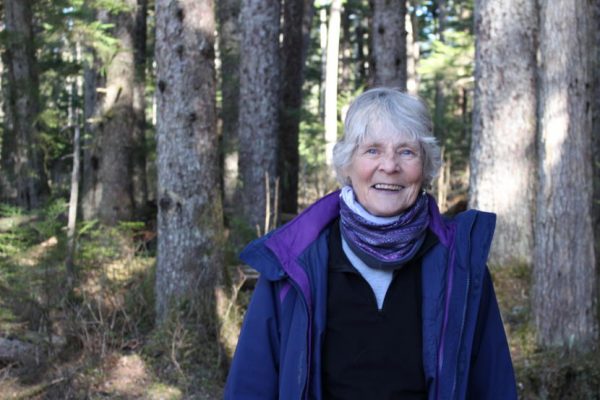
The state is still recommending healthy Alaskans get some fresh air while maintaining social distancing. Everyone knows being outside is a giant mood boost.
In Juneau, one forest guide started leading therapeutic walks before the coronavirus hit. She says there are lessons the forest can teach us during a pandemic.
Linda Kruger leads me down a popular hiking trail in Juneau, where there are patches of ice sticking to the ground. We are standing about 6 feet apart, but recommendations have since been expanded to a 20-foot clearance on hiking trails.
Kruger has led dozens of people on walks like this since receiving her certification as a forest therapy guide last spring. Kruger is not a therapist, but she says there is one hanging around.
Get the latest coverage of the coronavirus in Alaska
“The forest and nature are the therapist, and I will help guide us in having an experience,” Kruger said.
To have this experience, you don’t need to be in an altered state or believe in any particular doctrine or ideology. You just have to be fully in the moment — out here with a tangle of blueberry bushes and a thick canopy of hemlock trees and spruce.
There’s science to back this up. Outdoor mindfulness can lead to lower blood pressure and less stress hormones, among other benefits. In Japan there are even dedicated trails for spending therapeutic time outside. It’s part of the national public health system.
The Japanese expression for this translates to “forest bathing.” But it’s a practice you can do fully clothed, bundled up in a jacket, gloves and a hat.
RELATED: Experts warn of a “dark cloud” for kids’ mental health amid pandemic
Forest bathing is different than taking a jog outside or walking your dog. Kruger is about to lead me on a series of what she calls “invitations.” She says these exercises could be adapted for just about anywhere, even looking out a window. You just need a space that’s green. She thinks this could be especially helpful for people right now experiencing fear or dread because of the pandemic.
She points to a spot where a beam of sunlight is streaming through the trees.
“For the next 10 minutes, we’re going to experience this place using all of our senses,” Kruger explains. She instructs me to stand on an even surface and, if I’m comfortable, close my eyes.
“Breathe in,” Kruger said. “And notice your body, and notice how it feels to be present in your body here in this place.”
As instructed, I take in the smell of the damp earth, feel the pebbles beneath the soles of my feet and listen to the birds chirping.
“Listen for sounds that are interacting with each other,” Kruger said. “And then add your own sound! Breathe deeply or just make a sound yourself, so that you’re adding to the symphony around you.”

Kruger spent 28 years with the U.S. Forest Service. She was a social scientist, researching the effects of climate change on communities.
She says that was a formative experience. She saw how important an intact environment is for both physical and mental health. She became a forest therapy guide after she retired. So far, she’s been doing it on a voluntary basis.
“As a researcher, it makes sense to me, and what a wonderful way — especially in Alaska, where we have nature out our doorstep,” she said.
In March, Kruger sheltered in place after traveling back to Juneau from Texas and Seattle, where she was running a half-marathon. April will be the first month in seven years she hasn’t competed in one. Though she’s still planning on running the distance with her partner.
She says the coronavirus has taken a toll on her routine. Being outside provides some reprieve.
“But it’s been really challenging because I’m missing my friends, and I’m missing all the regular activities that I usually do,” Kruger said.
The second invitation in Kruger’s forest therapy session is to walk slow — like, really slow. The pace of a slug moving on the ground.
She acknowledges this part can be challenging for people who are used to moving faster.
“But you miss so much when you go fast, like right now,” Kruger said. “I’m seeing the moss, and I’m seeing the branches moving a little bit. If you’re walking fast, you miss those things.”
We don’t know when hunkering down orders will be lifted in Alaska, when things can go back to normal and people can return to school and work.
It feels weirdly chaotic, but also still. Kruger believes nature is like that, too.
Further down the trail, there’s a mess of giant trees which have fallen to the ground. A windstorm upended them. You can see the trees’ roots systems — the size of an overturned SUV.
Kruger says there’s a message there for our collective uncertainty. The forest has been through a lot.
“And it perseveres,” she said. “It’s a very resilient place, and so we can think about (that) and kind of absorb that resilience from nature … into us.”
So next time you’re outside, Kruger suggests:
- Spend about 10 minutes sensing the outdoors. Close your eyes, if that feels comfortable, and take a moment to pause and tune into smells, sounds and felt sensations.
- Open your eyes and take a moment to see what looks different than before. Then, begin a very slow walk, noticing what’s around you.
- Find a spot, like a tree stump, to sit in contemplative thought. Kruger recommends about 20 minutes.
- Express gratitude. Kruger likes to end her sessions with sipping locally foraged tea and pouring a little out on the ground to show thanks.
Additional resources: If you or someone you know needs help, call Careline at 1-877-266-HELP (1-877-266-4357), a 24/7 Alaska resource that can provide support, information and local resources.




